On weekends of mid-April, you can see local people gathering in front of the graves all over Okinawa. This is called “Shi-mi-“and it is a memorial service for the family’s ancestors. It is an important Okinawan custom to visit their family grave once a year.
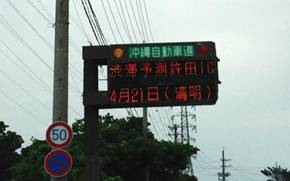
Electric Bulletin Board at Entrance to Expressway
Many Okinawan cultures have been greatly influenced by China. Even in recent days, we still practice many annual events based on the lunar calendar. The memorial service, “Shi-mi-”is derived from one of the twenty-four seasons of the lunar calendar in China, called “Seimei.” It falls on between February and March of the lunar calendar and it is the time when flowers and trees start to grow and things liven up. That is why Chinese made it a custom to clean their family grave and recall the deceased. In Okinawa, Shi-mi-, the Lunar Bon Festival, and Lunar New Year are the three biggest memorial services for the ancestors. Okinawan people do not have a custom to visit a grave as often as mainland Japanese people, so Shi-mi- is a very important annual event for the local people.

Okinawan grave has a unique shape and it looks a lot different from that of found in mainland Japan. Having a gate and an open space in front, it looks as if it were a house. When visiting a grave for Shi-mi-, the first thing to do is to clean around the grave to make enough space for everyone to sit down. Then, spread a picnic sheet and open the offerings that each family prepares.
Offerings for the ancestors in Okinawa are always packed in 2 layers of square boxes, called “Ju-bako.” There are strict customary rules for what to fill the boxes with and how many pieces to put in. There must be 3 rows of 5 pieces of round rice cakes in the first box. And in the second box, there must be 9 kinds of food; white and red kamaboko (boiled & semi cylindrical shaped fish paste), deep-fried tofu, tempura, deep-fried taro, shimmered kelp and burdock, konnyaku (jelly made from devil’s-tongue starch), and broiled pork. It is okay to change ingredients for tempura or shimmered vegetables and have different flavors of rice cakes besides plain kinds, but the numbers of pieces and kinds of foods must always be odd numbers.
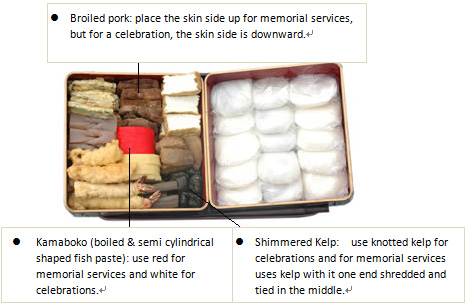
We place the Ju-bako offerings, fruits, snacks, and each glass of water and Japanese wine in front of the altar. We burn black and flat incenses (peculiar to Okinawa) as we pray for the peaceful life and everybody’s health during the past year and for the coming year.
It is believed that the ancestors are enjoying the offerings while the incenses are burning so the family members enjoy chatting with relatives meanwhile. When the incenses are burnt, we pick out one or two pieces of food from each container and flip them over. (This means that the ancestors have eaten the food.) Then, we thankfully share the offerings together.
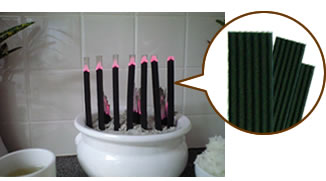
If non-Okinawan people see us doing “Shi-mi-” without knowing, I’m sure they will be so surprised and wonder “Why do they have picnic in front of the graves?” But in Okinawa, as many people believe in a concept of Ancestor Worship, Shi-mi- is like a having dinner with our ancestors who just happen to be unseen. Many Okinawan people don’t have religions. Instead, we believe that our ancestors for many generations become our guardian spirits after being passed away and they help us and lead us to take the right paths in our lives. When we are struggling, we regard it as the obstacles that our ancestors provide us on purpose so that we can develop to become more decent people. Ever since I was a child, my mother has taught me that we owe what we are today to our ancestors so we must not forget to be grateful for being who we are.
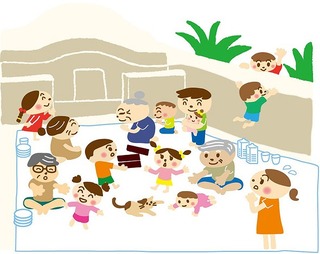
Also in a concept of Ancestor Worship believed in Okinawa, one’s spirit will reach the stage of a god at 33 years anniversary of their death only if the living descendants hold annual memorial services in proper ways. At the Shi-mi-, the elder members of the family always talk about such customs of Okinawa. They also tell us never to waste our precious lives that we were given from our ancestors, always to keep close bonds with family and relatives, and to be thankful for peace life.
In Okinawa, it is a custom that the first son of the family and his wife will rest in the family grave. For that reason, they inherit the house and become responsible for taking care of the family altars and holding the memorial services all through the year. It is my cousin, my father’s first brother’s first son, who is responsible for our family altars and grave even though he is much younger than my father. In my paternal family grave we visit every year, who are buried are my father’s first brother and his wife, my father’s parents, their parents, and four more generations. Of course, they were all first sons of the family in each generation. Tracing back where this grave was branched off, our family tree might have descended from a family in Shuri, an ancient capital of Okinawa. But this is a very old story that nobody knows the correct family tree anymore. This is also an established subject to talk about at Shi-mi-.
My father is the sixth son, so he cannot rest in his parent’s grave. When the time comes, he has to build his own grave. And my brother and his wife will go in sometime later and their son and his wife. This is how it continues.
Basically, we go for Shi-mi- where our parents rest in. Paternal side takes the first priority. Without exceptions, we visit my father’s family grave and if possible, we also visit our mother’s family grave. If they schedule on the same day, we deliver our offerings to the relatives in advance and ask them to pray for us.
If the weather permits, we usually stay at the grave for an hour or two, but it often rains in Okinawa around Shi-mi- time, so it is okay to leave right after providing offerings. (This year it was raining hard from the morning, so my parents and my brother went to serve incense only.) After sharing offerings, Shi-mi- ends when we burn “Uchikabi,” a farewell gift for our ancestors to take back which is regarded as money in the other world. Uchikabi is yellow and similar to paper towel. It can be purchased at any local stores.
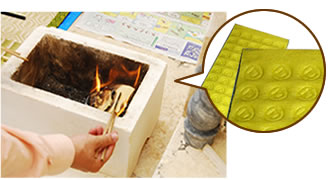
How did you find Shi-mi- event?
Okinawa is a part of Japan but we have our own peculiar customs and culture.
I take Shi-mi- for granted since I was a child, but as I reflect on deliberately, I realize there are deep meanings in every small detail. I’d like to learn more about my own customs and cultures so that I can pass down to next generations.
To complete this column, I referred to a web site which introduces Okinawa in many different fields. I found it very interesting and useful for not only those who are interested in Okinawa, but also for those who were born and raised in Okinawa like me. I’m sure you’ll enjoy it. Please check it!!
http://www.okinawastory.jp/special/tokusyu_1002/0600007029.html
Reported by Tomomi Tanaka, Sugahara Institute
